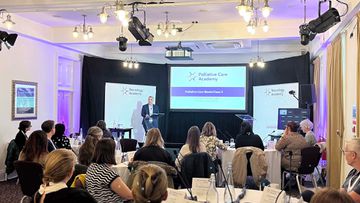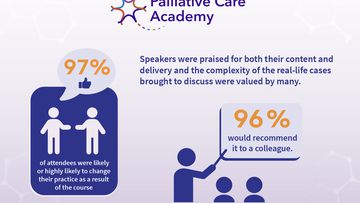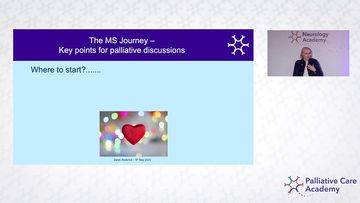Palliative care during the COVID-19 pandemic
KnowledgeAdvance care planning, discussions about palliative care and end of life wishes are as essential in the midst of a health pandemic as at any other time. However, during the COVID-19 pandemic, there may be less time available to have these vital discussions, the conversations may be taking place remotely or in time-compressed circumstances, and the settings where palliative care may be given are under a great deal of strain.
The latest updated guidance on palliative care and end of life care has all been helpfully compiled and is available via the British Geriatrics Society (BGS) website. BGS have published updated guidance for COVID-19 as well as some dementia-specific guidance for the end of life.
Palliative care is essential care
Dr Ed Richfield is a geriatrician, Parkinson’s Academy faculty member, and one of the lead developers of the Palliative Care MasterClass. He puts a huge emphasis on the benefit of taking a palliative approach with people from early on in their journeys, at a time when they can think clearly and without fear. He also talks about the rewarding nature of having really listened to someone when, at the end of their life, they are confident that their wishes are being followed, and the knowledge that their wishes remain relevant and important.
Of palliative care in general, Ed has said,
‘There is a lot of evidence of people being very badly prepared for the end of life and taking time to listen to people, to help them plan around what happens without barriers, makes a huge difference to people’.
During the COVID-19 pandemic, these discussions are being held at a time of stress and fear, whilst many are concerned about being in healthcare settings. They may be being held at a distance, removing the face-to-face interactions and body language cues that makes these vulnerable discussions feel comfortable. They might need to happen in a situation where there is no prior relationship or trust built between the patient and practitioner.
Holding remote conversations with sensitivity
Admiral nurse Dr Karen Harrison Dening has provided a short video both discussing the importance of advance care planning, but more specifically noting challenges in discussing advanced plans at the moment, during the coronavirus pandemic. Karen specifically references dementia in her film, but the principles can be applied far wider.
She notes that discussions about ACP can be difficult conversations, relying on relationships and trust, and requiring multiple conversations over a period of time.
Karen reports on the experiences of some nursing staff who, in hospitals, are having to have palliative care conversations within a twenty minute window without the softness and gentleness that is usually used (9.18).
Karen offers some practical thoughts on holding palliative care and advanced care plan discussions in a remote way (11.53)
International learning and advice
A recent opinion piece in the British Medical Journal reports on the rapid re-thinking of palliative care in Italy during the peak of the coronavirus and provides a stark commentary on palliative care for those with coronavirus in hospitals.
Jennifer Moore Ballentine of the Shirley Institute for Palliative Care in the United States wrote a piece recently on her views of palliative care and its place within the COVID-19 pandemic, stating,
‘Those who are elderly, frail, and/or with underlying chronic or serious illness are most at risk from the novel coronavirus. These are palliative care’s core patient population. Utilising the unique skills and strengths found in palliative care must be part of the response.’
The Center to Advance Palliative Care has a series of FAQs responding to various questions around palliative care during the COVID-19 pandemic, many of which may be transferable to a UK setting.
Encouraging families to normalise these discussions
UK charity Dying Matters do not have any specific advice regarding COVID-19 and palliative care or end of life care, but their resources offer simple ideas on how to have potentially difficult conversations about dying. The resources can be useful for families too, to encourage them to normalise conversations about their wishes for their own deaths, no matter how far away that death might be.
Encouraging discussions about palliative and end of life wishes within family households is safe and possible during this coronavirus outbreak for those who do not live alone, and could make the conversations feel safer and easier across family members, whilst taking some pressure from healthcare services and staff. Dying Matters’ resources may be a helpful signpost in encouraging this more.
Related articles
For every person, at any stage
Palliative Care Academy challenges the idea of palliative care as a late-stage service. Whilst recognising the practical nuances and bespoke approaches needed in palliative care for people with dementia, Parkinson's, MS and motor neurone disease respectively, the Academy promotes a holistic and positive approach to palliative care at any stage of any condition.


